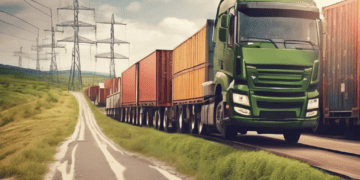In the realm of global supply chains, the quest for sustainability has become a paramount concern. Companies are increasingly facing pressure to not only ensure efficiency and profitability but also to demonstrate a commitment to sustainable practices. Achieving sustainability, however, is fraught with challenges, particularly in terms of enhancing transparency and traceability across the supply network.
Transparency and traceability are critical in today’s complex supply chain environments, enabling companies to monitor and verify the sustainability of their operations. These capabilities, however, are not easily achieved. One major obstacle is the seamless integration of data across various systems utilized by multiple stakeholders within the supply chain. This integration is essential for maintaining data privacy while managing potential conflicts of interest that arise when supply chain partners serve multiple clients.
Moreover, the accuracy, security, and proper utilization of data play a significant role in supporting sustainability reports and initiatives. A systematic approach is necessary to address these challenges, with an emphasis on sourcing strategies that contribute to sustainability goals.
The process begins with the consolidation of data, including certifications and details about materials, facilitated by the use of Global Trade Identification Numbers (GTINs). This step is crucial for standardizing traceability and ensuring that all collected data is harmonized. Ensuring compliance with both local and international regulations through rigorous checks and balances is also vital. Furthermore, integrating data across functions and entities helps establish a unified information base, which is the cornerstone for achieving transparency and traceability throughout the supply chain.
Following data consolidation, the next phase involves traceability modeling. This step structures the data in a manner that allows for the efficient tracking of a product or material’s lifecycle, from procurement of raw materials to delivery to the end consumer. For example, information on the organic status of crops or farming certifications must be standardized to evaluate sustainability metrics effectively. Although the process may seem straightforward initially, the complexity increases significantly for large organizations that source a myriad of materials globally, all of which must adhere to a plethora of certification standards.
The final step focuses on supply chain reporting. Centralizing and formatting data to facilitate the measurement of key performance indicators (KPIs) enables the generation of reports that assess the performance of suppliers across the supply chain. These reports not only enhance transparency for internal and external stakeholders but also help in identifying and mitigating risks promptly.
To streamline these processes, the adoption of a central hub for monitoring and enhancing the sustainability practices within the supply chain is recommended. Such a hub can aggregate and harmonize data from various sources, both internal and external, ensuring comprehensive coverage for analytics, dashboards, and reports. Moreover, it can facilitate efficient data sharing across the supply chain ecosystem, enhancing the speed and accuracy of sustainability efforts. Regulatory compliance further benefits from standardized processes facilitated by such a centralized system.
Companies often utilize central hubs to improve visibility and address data management complexities across multiple locations and production processes. These hubs feed data into artificial intelligence and machine learning models, enabling comprehensive views of inventory and manufacturing operations.
For instance, when addressing sustainability gaps in specific segments of the supply chain, such as the environmental practices of palm oil suppliers in a particular region, a central hub can swiftly collect and process the necessary data. This ensures that information regarding suppliers’ adherence to sustainability criteria is readily accessible for decision-making processes.
Technological solutions, tailored to specific needs, can significantly enhance supply chain transparency and traceability. Whether for procurement to ensure sustainable sourcing, logistics optimization, or product tracking to mitigate environmental impact, these solutions contribute to the development of an end-to-end visibility platform that aligns with global sustainability reporting standards. This comprehensive approach sets the stage for a sustainable future for global supply chains.
By adopting such advanced technologies and methodologies, businesses can address the pressing challenges of creating sustainable supply chains. This endeavor not only contributes to the environmental and social goals of the global community but also enhances the operational efficiency and brand reputation of the companies involved. The journey towards sustainability in supply chains is complex and requires a multifaceted approach involving data management, technological integration, and adherence to ethical practices. However, with the right strategies and tools, it is possible to navigate this path successfully.
The implementation of a central hub, as described, exemplifies the innovative solutions that can facilitate this transition. By centralizing data and enabling efficient traceability and transparency, companies can gain a clearer insight into their supply chain operations. This, in turn, allows them to identify areas for improvement and to take proactive steps towards sustainability. Furthermore, such systems enable companies to comply with regulatory requirements and to meet the increasing demands of consumers for ethical and sustainable products.
In conclusion, the creation of sustainable supply chains is an imperative for businesses in today’s globalized economy. While the challenges are significant, the benefits of pursuing sustainability — including enhanced operational efficiency, improved compliance, and a stronger brand reputation — are undeniable. The strategies outlined in this article provide a roadmap for companies seeking to achieve these goals. By focusing on data consolidation, traceability modeling, and comprehensive reporting, and by leveraging technological solutions such as a central hub, businesses can make substantial progress towards sustainability. The journey is ongoing, but with commitment and innovation, a more sustainable future for global supply chains is within reach.
Catch the latest in supply chain news on The Supply Chain Report. Visit ADAMftd.com for free international trade tools.
#TheSupplyChainReport #SustainableSupplyChain #SupplyChainSustainability #DataIntegration #SupplyChainTransparency #GlobalTrade #EthicalSourcing #SupplyChainInnovation #SustainabilityReporting #SupplyChainNews















